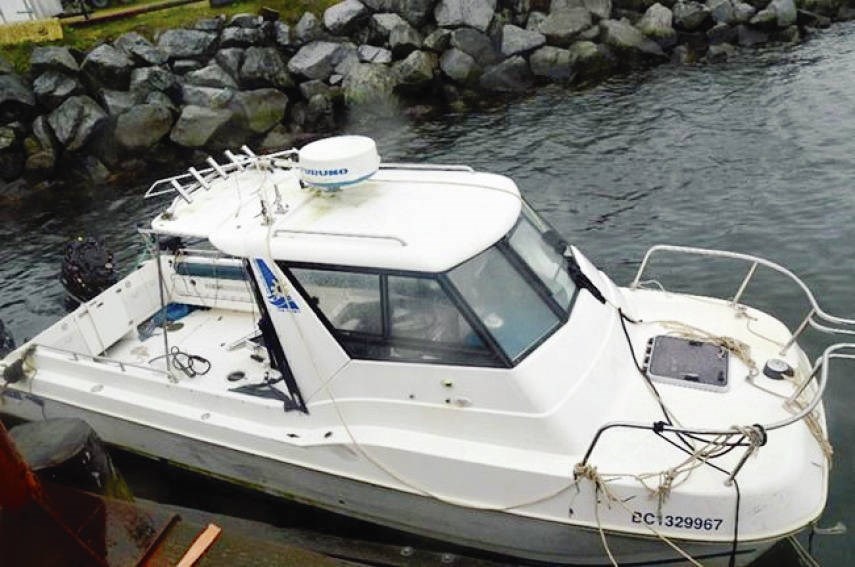The owner of a sports fishing charter feels extreme remorse and still has nightmares about the day his vessel was swamped off Tofino four years ago, killing two passengers. That information was revealed during Richard Grimm’s recent sentencing hearing in Port Alberni provincial court.
The April 30, 2017 tragedy was investigated by the RCMP but no criminal charges were laid. However, Grimm, owner and operator of the Catatonic, was charged under the Canada Shipping Act and pleaded guilty to failing to demonstrate how to wear a lifejacket before the vessel left the dock.
At the October hearing, Grimm was so overcome with emotion he was barely able to speak. “I take responsibility. Every day, I think about them,” he said through tears. “I’m sure that if anything ever happens out there again that I have a lot more experience, and I will pass that on to the other guys on the dock.”
Judge Lisa Mrozinski accepted a joint proposal from Crown and defence to place Grimm on probation for two years with conditions that he complete more marine training and 25 hours of community service. Grimm is also required to notify the coast guard when he takes passengers on his boat and let them know where he will be fishing.
Mrozinski stressed that she wasn’t sentencing Grimm for the loss of the two lives, but for his failure to comply with a statutory obligation. “There is no sense at all this was an intentional act. It was a failure to do what you were required to do under
“No one knows better than you — other than the families of the deceased — the consequences of that failure.”
Mrozinski noted that the 37-year-old former deckhand had no previous violations. The court heard that Grimm moved to Tofino 15 years ago and lives on a small island with his wife and daughter. He worked on the Catatonic for its previous owner, then bought the boat in 2015. The Crown did not seek forfeiture of the vessel.
An agreed statement of facts revealed that on the morning of April 30, 2017, four paying passengers boarded the twin-hulled catamaran. The ocean was choppy and southwest winds were gusting to 21 to 34 knots.
Three hours after leaving the dock, waves started to hit the Catatonic. Ten minutes later, it was swamped, its stern submerged.
A large wave hit the vessel and Grimm and his passengers jumped into the frigid water. Search-and-rescue personnel found them an hour and 40 minutes later, but by that time, two Alberta men, Mike Cutler and Alvin Beckley, had died.
The court heard that there was no life raft aboard the Catatonic, and although Grimm showed his passengers where the lifejackets were kept, he didn’t show them how to put them on.
Beckley had trouble getting his lifejacket on and the other passengers tried to help him. Eventually, Beckley was able to get the strap fastened but the lifejacket wasn’t on properly. There was also evidence that one passenger was wearing a child’s lifejacket.
The Transportation Safety Board found that with seas washing over the deck, the bilge pumps, the GPS and the VHF radio on the Catatonic stopped working. Grimm called in a mayday using his cellphone, but because the GPS wasn’t working, he could not give the correct location of the vessel.
Planes and boats started searching the area without success. Eventually, the coast guard called a friend of Grimm’s, who was able to tell them where Grimm usually took clients. By the time search-and-rescue crews arrived, Beckley and Cutler were unconscious.
The Transportation Safety Board found that the flares on the vessel had expired in 2007. The EPIRB — the emergency-position indicating radio beacon — was defective. The personal locator beacon was working, but Grimm did not know how to activate it.
The safety board found the vessel was not properly registered, and that significant parts of it had been modified so that both batteries, the vessel’s only power source, charged and drained simultaneously. The original motors had been replaced with two 225 horsepower motors, which constituted a major modification that Grimm was required to report to Transport Canada.
In December, at a second sentencing hearing for the numbered company running the fishing charter, Grimm pleaded guilty to failing to register the Catatonic as required under the Canada Shipping Act and failing to inform the transport minister that the engines had been replaced.
Grimm, as sole operator and director of the company, was given 12 months to pay a $6,500 fine.
In its report on the incident, the safety board noted that with an appropriately donned lifejacket, the most likely cause of death is hypothermia, which usually takes 30 minutes. If a lifejacket is not put on correctly and does not keep an individual’s head above water, the most likely causes of death are cold shock, which can happen in the first few minutes, and incapacitation, which takes five to 30 minutes.



